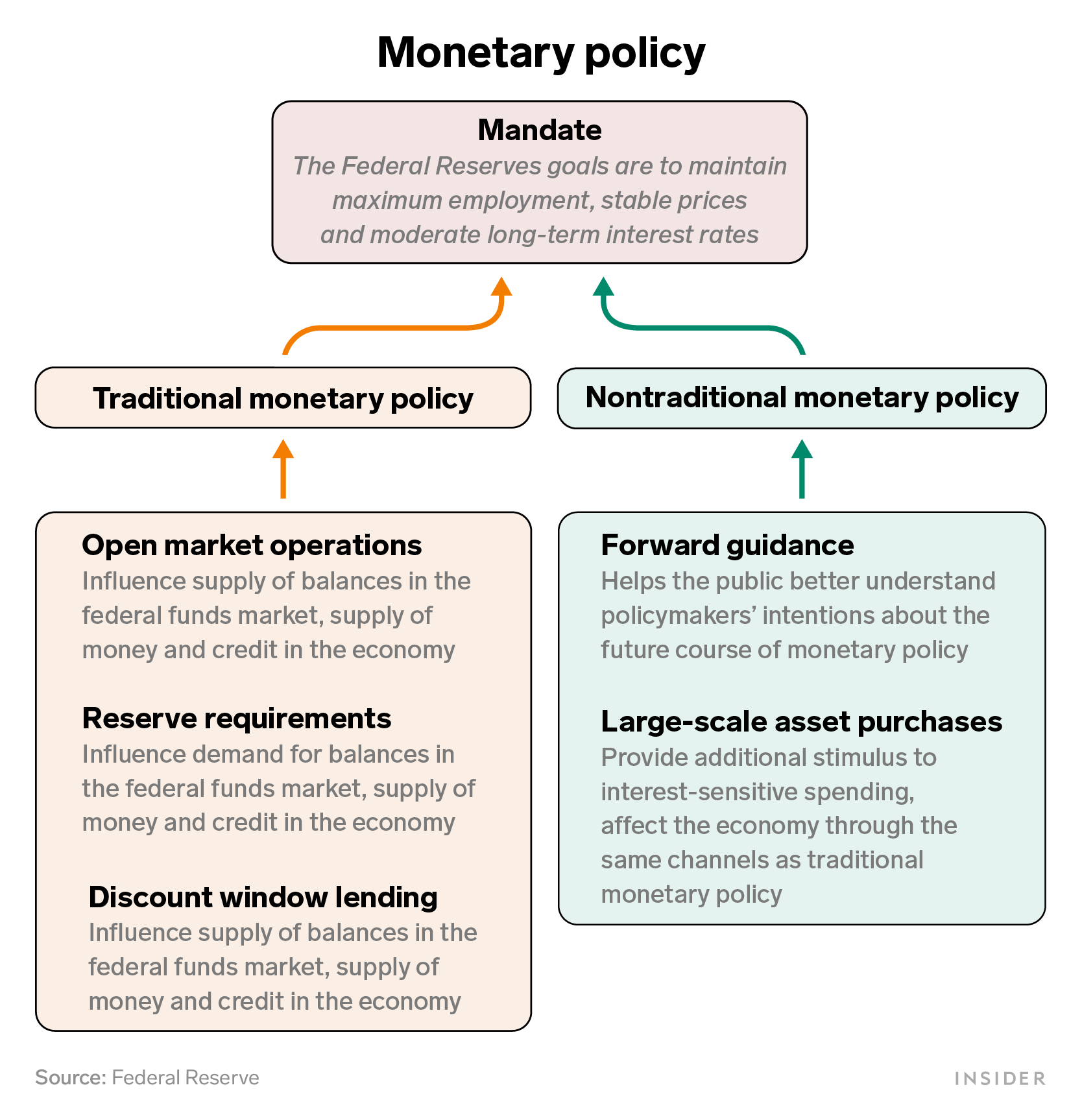
Hill Street Studio/Getty
- Fiscal policy describes how a government uses taxation and spending to influence the economy.
- Fiscal policies can be neutral, expansionary, or contractionary depending on the goal.
- Changing fiscal policy could affect interest rates, inflation, employment, and your investments.
- Visit Insider's Investing Reference library for more stories.
Fiscal policy is how a government manages spending and taxation levels in ways intended to influence the economy. If US officials want to stimulate growth, they might increase spending or cut tax rates. Conversely, they might want to slow down an overheating economy with lower spending and higher taxes. In turn, these changes can have an impact on interest rates, employment, trade deficits, and inflation.
Current US fiscal policy has its roots in Keynesian economics – which makes a case for the proactive government response to crises and up-and-down business cycles. Fiscal policy may be intertwined with, but is separate from, monetary policy.
How does fiscal policy work?
Fiscal policies are always present, but changes in them may be driven by a specific situation or a broad agenda.
"You can have specialized fiscal policy, such as the response to COVID, where the federal government gets together and provides relief," says Kevin Flanagan, head of fixed income strategy at WisdomTree.
In responding to COVID, the government's emphasis was on increasing spending through relief programs, including direct stimulus payments and Paycheck Protection Program (PPP) loans. Specialized fiscal policy responses also occurred during the Great Recession, such as the Troubled Asset Relief Program (TARP). The government's increased spending was driven, in part, by a desire to end the recession.
Not all fiscal policy changes are made in response to a crisis. For example, the 2017 Tax Cuts and Jobs Act (TCJA) is an example of an agenda-driven fiscal policy. "One is reactive, and one is more in line with everyday government," explains Flanagan. "They're trying to determine policy going forward."
Officials may take a neutral approach if there's a stable economy that they want to maintain. However, changing business cycles or a crisis may quickly lead to expansionary or contractionary policies.
Who determines fiscal policy in the US?
In the US, the executive and legislative branches have the most direct impact on fiscal policy.
"While the president requests a budget that outlines [their] priorities, Congress ultimately controls the government's purse strings and sets fiscal policy," explains Jason Blackwell, chief investment strategist at The Colony Group.
The judicial branch could also have an influence on fiscal policy if it finds spending or tax proposals are unconstitutional.
Fiscal policy vs. monetary policy
In the US, the Federal Reserve, or Fed, is an independent federal agency that sets the country's monetary policy.

While fiscal policy tends to be targeted, Blackwell says monetary policy is often a blunt tool that can influence consumers' and business' interest rates and borrowing. And while they're different and separate from each other, fiscal and monetary policy work in tandem at times.
"For example, in the last two recessions, the Federal Reserve lowered the lending cost for banks to incentivize them to make more loans to businesses, while Congress authorized cash infusions more directly to consumers and businesses," says Blackwell.
However, at other times, the government's fiscal and monetary policies may counteract each other. "If fiscal policy is being viewed as restrictive, perhaps the Fed would want to counter or offset that," says Flanagan.
How can fiscal policy affect investments
Fiscal policies may have direct and indirect impacts on your investments.
Consider, for example, a new tax rate that could leave you with more or less money to invest. And new rules about tax-advantaged accounts could require you to adjust your investment strategy.
For investors, the impact fiscal policy can have on the overall economy, interest rates, specific industries, and individual companies can be quite significant, says Blackwell.
Fiscal policy can also impact the overall economy, interest rates, specific industries, and individual companies. "For investors, the impact can be significant," says Blackwell.
He shares a hypothetical example related to the clean-energy industry to explain: "If the government allocates tax credits and prioritizes spending within the space, it can create risks for traditional energy companies and opportunities for new entrants."
Predicting fiscal policy might not be possible. But being aware of changes and their potential consequences is important.
The financial takeaway
Fiscal policy is the government's approach to spending and taxation. Both reactive and agenda-driven policies could affect your household's financial situation, as well as the overall economy.
"We tend to focus on fiscal policy during times of crisis," says Blackwell. "For example, the automaker bailouts in 2008 or the PPP-loans in 2020. Those are examples of the government targeting spending to specific sectors of the economy to smooth the economic recessions."
However, agenda-driven fiscal policy decisions may have a much longer time horizon. Whether it's a change to the tax code or a new infrastructure plan, the impact of fiscal policy could play out be felt for decades to come.










